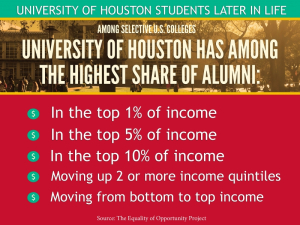Stellar academics, strong career prospects for graduates and affordability are among the reasons the University of Houston has been featured in The Princeton Review’s 2017 edition of “Colleges That Pay You Back: The 200 Schools That Give You the Best Bang for Your Tuition Buck.” In addition, a recent study by the Equality of Opportunity Project shows UH is among the best universities in the U.S. at turning low-income students into top earners.
At UH, 45 percent of undergraduates receive need-based scholarships or grants. Despite the challenges faced by many students, UH is among the best universities in the U.S. for return on investment and the upward mobility of its students.
“Higher education is a big investment, but a degree from UH pays off—our students tell us so and the data supports it,” said UH President Renu Khator. “The University is committed to affordability and value, and our graduates see the return on that investment with career opportunities and earnings.”
UH graduates are among the most upwardly mobile in the U.S. UH was ranked among the highest selective public colleges for “share of students who moved from the bottom to the top income quintile” in the recent study led by principal investigators from Stanford, Brown and Harvard. The study collected data on 30 million college students from millions of anonymous tax records and compared peer institutions in economic diversity and student outcomes.
Outcomes
UH ranked among the top “selective public colleges” in:
- highest median income for women at age 34
- share of students who ended up in the top 5 percent
- share of students who ended up in the top 10 percent
- highest average income percentile of a poor student
Mobility
- 4.9 percent of students at UH came from a poor family (bottom income quintile) but became a rich adult (top income quintile), compared to the average upward mobility rate for U.S. colleges of 1.9 percent.
- 32 percent of UH students moved up two or more income quintiles.
- UH’s overall mobility index was No. 38 out of the 369 selective public colleges.
In an effort to keep student debt low, the University offers a number of programs, including the Cougar Promise, which guarantees free tuition and mandatory fees to new in-state freshmen with family incomes at or below $45,000; UHin4, a four-year fixed rate tuition program; a $10,000 degree option; and a number of university-funded academic scholarships. In UH’s profile in the Princeton Review’s “Colleges that Pay You Back,” students describe UH’s financial aid packages as “considerably higher than other institutions,” and instrumental in “helping bright kids from low-middle-income households build an optimistic future.
The Princeton Review chose the schools for “Colleges That Pay You Back” (Penguin Random House / Princeton Review Books) based on ratings for 650 schools last year. The ratings weighted 40 data points that covered everything from academics, cost and financial aid to graduation rates, student debt and alumni salaries. Data from surveys of administrators and students in 2015-16 and from PayScale.com surveys of alumni conducted through April 2016 were also used in the ratings. According to PayScale.com, UH graduates with at least a bachelor's degree have a median starting salary of $51,600 and median mid-career salary of $85,700.
"We highly recommend the University of Houston, and all of our Colleges That Pay You Back schools. They stand out not only for their outstanding academics but also for their affordability via comparatively low sticker prices and/or generous financial aid to students with need – or both," said Robert Franek, The Princeton Review’s senior vice president/publisher and lead author of the book. "Students at these colleges also have access to extraordinary career services programs from their freshman year on, plus a lifetime of alumni connections and post-grad support."
